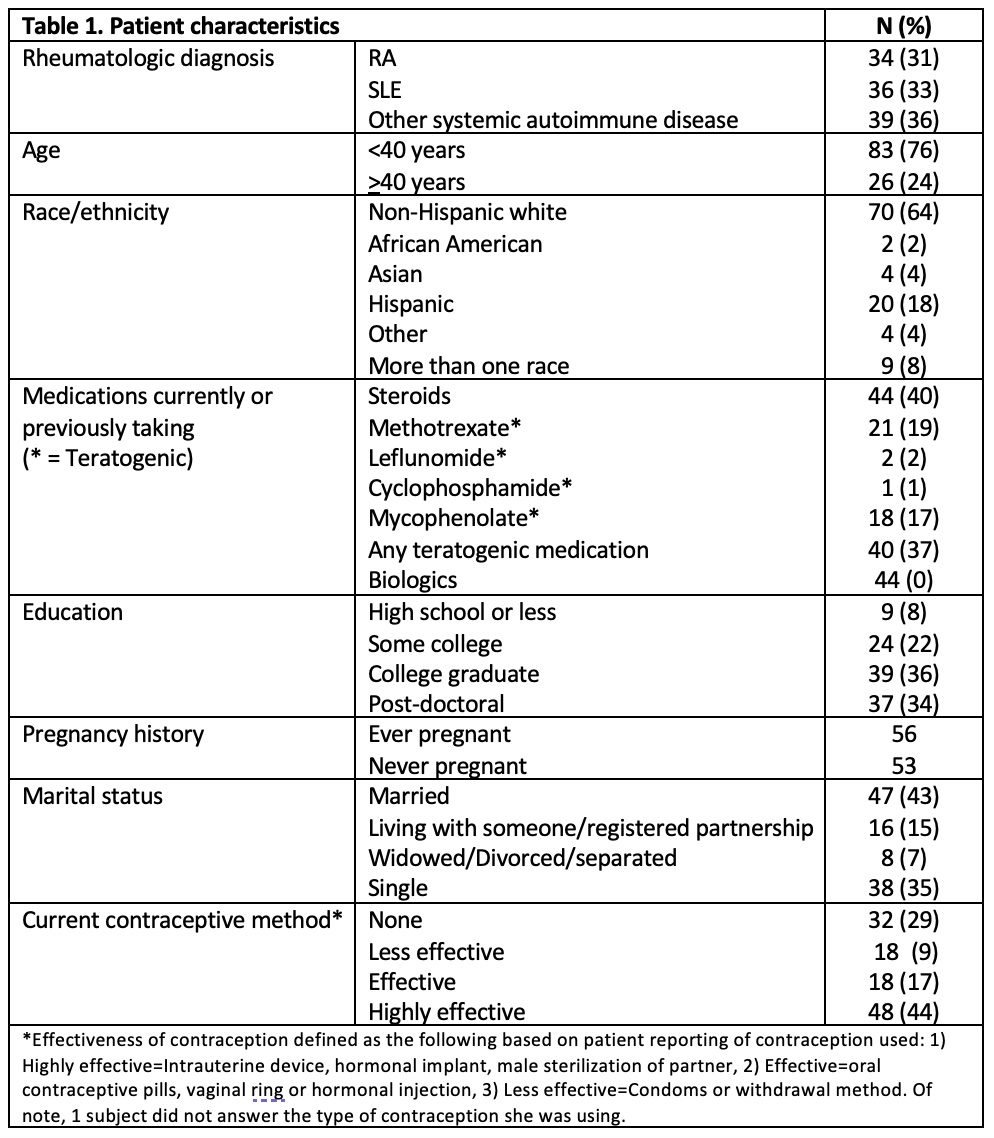Session Information
Date: Sunday, November 7, 2021
Title: Measures & Measurement of Healthcare Quality Poster (0623–0659)
Session Type: Poster Session B
Session Time: 8:30AM-10:30AM
Background/Purpose: Systemic autoimmune conditions affect women of childbearing age, and teratogenic medications are commonly prescribed as treatment. In this study, we surveyed rheumatology patients to identify areas of focus that would be most effective to improve quality of care for female patients of childbearing potential.
Methods: We included 109 female patients who were seen in follow-up at an academic rheumatology practice, were 18-50 years old, had a diagnosis of any systemic autoimmune condition, were English-speaking and had no history of surgical sterilization or hysterectomy. An online survey was used to obtain patient perspectives on pregnancy, contraception, and their experiences with counseling about these topics. Definitions of teratogenic medications and highly effective, effective and less effective contraceptive methods are listed in Table 1.
Results: Patient characteristics are in Table 1. In all patients, 70% reported having ever been counseled about contraception or pregnancy risks of their medications by a rheumatologist. Reported rates of counseling were higher in women who took teratogenic medications (p< 0.01), had lupus (p=0.03), self-reported as non-Hispanic white (p=0.04) or were < 40 years old (p=0.01) (Table 2). Using multivariate logistic regression, ever use of teratogenic medications (OR=3.2, 95% CI 1.1-9.4, p=0.03) and non-Hispanic white race/ethnicity (OR=3.0, 95% CI 1.0-8.8, p< 0.05) remained significant predictors of ever counseling, after adjusting for age and lupus. In 31 women currently taking teratogenic medications, 84% reported ever counseling about contraception by a rheumatologist, but only 65% reported using effective or highly effective contraception. Those who reported ever counseling were more likely to be on effective/highly effective contraception compared to those who reported no counseling [24/26 (92%) vs. 2/5 (40%), p=0.02, respectively]. Regarding pre-conception counseling, among 56 women who had ever been pregnant, only 43% reported ever receiving pre-conception counseling by a rheumatologist or other health care provider.
Conclusion: In an academic rheumatology practice, women of childbearing potential reported moderately high rates of ever receiving counseling by a rheumatologist about contraception and/or pregnancy-related safety of their medications. However, we identified areas of focus that could improve counseling rates in our clinics, including a need to focus on improving counseling rates for non-white patients. The importance of contraception counseling is highlighted by our patients currently taking teratogenic medications, in whom we found an increased use of effective or highly effective contraception in women who had received counseling compared to women who had not. Our findings also highlight a need to improve pre-conception counseling rates in rheumatology patients, which were quite low at 43%. Further study is needed to determine what interventions will be most effective to ensure that all rheumatology patients with the potential for pregnancy receive appropriate counseling for either the prevention of unplanned pregnancy or planning for pregnancy, depending on each patient’s preference.
To cite this abstract in AMA style:
Skorupa T, Carvajal G, Sturm K, Kwag J, Zell J, Demoruelle K. Contraceptive and Pre-conception Counseling in an Academic Rheumatology Practice: A Needs Assessment to Identify Gaps in Care [abstract]. Arthritis Rheumatol. 2021; 73 (suppl 9). https://acrabstracts.org/abstract/contraceptive-and-pre-conception-counseling-in-an-academic-rheumatology-practice-a-needs-assessment-to-identify-gaps-in-care/. Accessed .« Back to ACR Convergence 2021
ACR Meeting Abstracts - https://acrabstracts.org/abstract/contraceptive-and-pre-conception-counseling-in-an-academic-rheumatology-practice-a-needs-assessment-to-identify-gaps-in-care/


